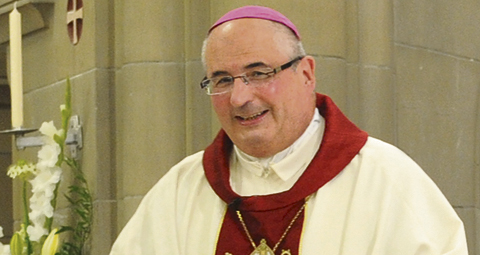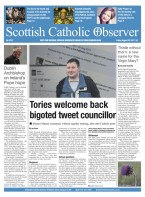BY Ian Dunn | September 7 | ![]() 0 COMMENTS
0 COMMENTS ![]() print
print

The pillars of family and the Faith
In an exclusive interview with IAN DUNN, prior to his installation as Archbishop of Glasgow, Archbishop-elect Philip Tartaglia gives an insight into his family life and explains how he was called to priestly life and his continued fervour for the Faith
IT ALL comes back to family for Archbishop-elect Philip Tartaglia. One of nine children of an Italian family growing up ‘up a close in Dennistoun’ his childhood saw an entwining of Faith and family that is impossible to untangle.
“The boys were altar servers, the girls were in the choir, I played for the boys guild football team, the priests were involved in all our family decisions,” he said. “My earliest experience of the Faith was of a parish life that my whole family were involved in.”
He is keen to stress that he hopes he is not nostalgically ‘harking back to a golden era’ but that, despite the travails of growing up as one of nine children in 1960s Glasgow, he recalls it as a ‘really happy, lovely time’ because of the strength of the family bond and the support they in turn received from the Church.
“Growing up with your brothers and sisters all round about you, two parents married to each other, who love each other and work together in perfect harmony for the sake of the family, that is always going to remain with you,” he said. “And that is something you always would want to see replicated.”
Issues of identity
While the Tartaglias were one big happy family, there were however, external pressures.
“We were very aware of our Italian background,” he said. “People would refer to it in a negative fashion, there wasn’t massive discrimination but people would comment. Especially as we were nine children growing up in a close in Denniston which wasn’t exactly a Catholic ghetto.”
For his father, who was born in Italy and came to Scotland as an infant, his nationality caused more problems, as, at the outbreak of the Second World War, he was picked up and detained on the Isle of Man for three and a half years.
“It is not something we referred to much,” he recalled. “But it is there as part of our common past and the way we related to the British state, but it never stopped us doing anything.”
His father never took British citizenship, however, and the archbishop-elect joked that one mistake his parents took was not to speak Italian around the house because they feared the children would grow up with an ‘ice cream shop’ accent.
That was a wariness the family felt extended to football, but was not complete.
“Me and the boys would support Italian football teams,” he recalled. “But Celtic was on another level all together. In the European Cup final against Inter Milan there was no question of a conflict, not even for my dad.”
As that tale suggests, he admitted having a complex sense of ethnic identity. “I am primarily Glaswegian, after that it gets complicated,” he said, but his sense of family is clearly integral to him.
“I think most of my family married someone in, or close to, the Italian community,” he said. “That culture has never gone away for us, it is very much a part of me.”
Call to the priesthood
A key part of that family identity growing up was a respect for priests, and the archbishop-elect recalled that the first thing his parents did when he said he wanted to be a priest was to go and ask the local priest what he thought of the idea.
“They never pushed me,” he mused. “For people who were so keen on the Church, they were cautious and wanted to make sure it was the right thing.”
For his part, he was just inspired by having priests around him.
“It came out of just being so involved in the parish,” he said. “And having three priests in the parish that were an inspiration.”
His vocation took him to Blairs junior seminary then on to the Scots College in Rome, where he adapted to the Italian sunshine very well.
“It was a very enjoyable life,” he recalled. “I enjoyed study, I enjoyed Rome, I enjoyed playing football, it was a rich life.”
However, it was during this time that he questioned the path he was on.
“I asked myself the hard questions about what I wanted to do,” he said. “But when I did that I felt that God was beckoning me forward. In a sense it was a wee kind of leap you take, but it was a leap into the arms of God.”
Testing times
His Faith having overcome that test, it was to give him solace in a very difficult time, a few years after his ordination, when his mother died at the age of 53.
“I was 29 years old doing doctoral studies out in Rome,” he said. “My sister called me to come home but by the time I got back my mother had died. It was a terrible sadness; she was all together too young. It was a big moment in our lives.”
He celebrated his mother’s funeral Mass, and Cardinal Thomas Winning who ‘knew her and was fond of her’ gave the homily.
“Everyone tells me it was the best homily he ever gave,” the archbishop-elect reflected. “I don’t remember a word of it, I was in another dimension. But we had no doubt she was with God, we were all so proud of her and had so much love for her.”
That faith that sustained him then was further refined and refreshed by the two pillars that marked his priestly ministry before becoming Bishop of Paisley: parish life and academia. He spent many years teaching at the Scots College in Rome before serving for more than a decade as parish priest first at St Patrick’s, Dumbarton and then at St Mary’s, Duntocher.
“I think that combination has been very good for me, though others maybe would have a different view but I think it has been good,” he said. “That mixture of the intellectual and the pastoral, bringing a fusion of them together has helped me as a bishop.”
Promoting the Faith
He believes a key aspect of his ministry in Glasgow, as it has been in Paisley, will be to ‘get people engaging again with their Faith.’
“I think that is the essential aspect of the New Evangelisation, to help people find the real joy and fruitfulness of the Catholic Faith,” he said. “Because I believe it answers the questions of life more fully and completely than any other wisdom, philosophy, or approach to life.”
Despite that profound conviction, he is very aware that the wider world is increasingly sceptical of the Church and its teaching.
“Recently it has been a pretty hostile environment and I think we can expect more of that in future,” he said. “I think that it will test our Faith but it will also test our skill because we need to find a way to protect ourselves yet still make a contribution to the common good. You may have to take some tactical adjustments or think pragmatically in order to protect yourself and the Church but we must never lose sight of engagement with the wider world.”
That hostility to religion seems a long way from the world the archbishop-elect grew up in.
“The world then was much more supportive to religious vision,” he reflected. “Even if it wasn’t a Catholic religious vision that was round about us, it was still a Christian religious vision. The world nowadays is not supportive, and young families are particularly under strain and at risk.”
It is this conviction of the importance of the Christian vision of the family that underpinned the Catholic bishops’ opposition to Scottish Government plans to legalise same-sex ‘marriage.’
“I think it is the most important moral and social policy decision since abortion,” he said quietly. “And I think the Church was quiet at the abortion act, it was persuaded that it wouldn’t be that bad, and so we got on the front foot pretty quickly this time. Though the government invited us to and we did it, we were asked to respond and we did, in a way that was clear and measured, and was not meant to cause offence.”
The political row over same-sex ‘marriage’ threatened to engulf the archbishop-elect personally, when a video of him commenting on the death of the late MP David Cairns emerged, an incident he clearly regrets.
“It was an unguarded moment, an indiscretion, possibly I thought the occasion was more intimate that it was,” he said.
The media furore that came out of that was clearly difficult for him
“I am basically a reserved person, I don’t enjoy seeing my name or picture,” he said. “My real desire is to just quietly support the Catholic community.”
As he looks forward to becoming Archbishop of Glasgow he admitted to having doubts.
“Being kind of reserved about things, there is a natural kind of reticence and respect for something quite sacred and challenging, and apprehension at moving out of your comfort zone as well as the natural sense of unworthiness you should always feel when being asked by God to do something,” he said.
In the end he finds solace in the eternal nature of the Faith.
“John Paul II said we should use the Word of Jesus, and at my best I do that, I think: ‘do not be afraid I am with you always till the end of time,’” he said. “That has to be the prism out of which we see the world, a vision of hope. The Cross is always going to be part of the life of the Church but the Cross itself is what gives us hope.”
PIC: PAUL McSHERRY











